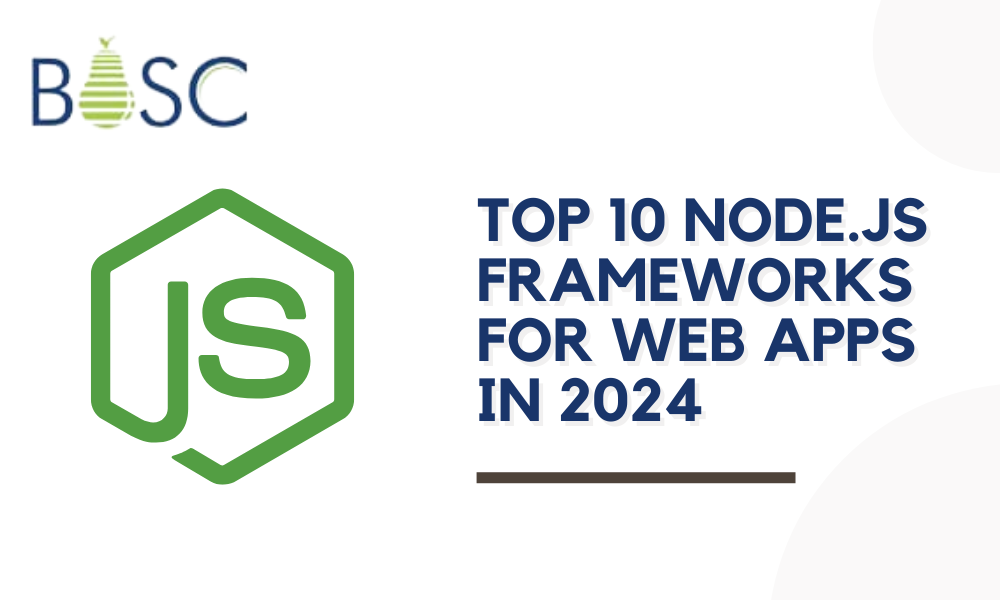Node.js is a widely used open-source, cross-platform JavaScript runtime environment that enables developers to make accessible and high-performance web apps. To make real-time data, and data-intensive web applications, the enterprise uses Node.Js. However, for the development of web apps, Node.js provides a broad range of frameworks. In this blog, you will learn the top 10 Node.js frameworks of 2024 in the web app.
What are the benefits of the Node.js framework?
1. Easy Scalability
One major pro of Node.js is that programmers find it simple to scale apps in horizontal and vertical directions. The apps are scaled horizontally by adding additional nodes to existing systems.
Node.js includes extra resources for single nodes because of the vertical scaling of the application. Hence, it is scalable and gives a better option than the other JavaScript servers.
2. Easy to learn
Since JavaScript framework is the most popular programming language, front-end developers have a good grasp of it.
It becomes much easier for them to begin utilizing node.js at the backend. Thus, it is easy to learn Node.js and consumes less time to work with it.
3. High-Performance
Node.js interprets JavaScript code through Google’s V8 JavaScript engine. This engine compiles JavaScript code which is directly into machine code. It is easy and fasts to integrate a code effectively.
Hence, the speed of code execution is enhanced by the runtime environment as it aids non-blocking I/O operations.
4. Fullstack JS
Node.js has been considered full-stack JavaScript for serving both client and server-side apps. Thus, the benefit is that you do not need to hire developers for backend and front-end development, and it saves time and money.
Also Read: Differentiate MERN and MEAN Stack Web Development
5. Large Community
Node.js has a vast and active community of programmers who constantly contribute to further development and improvement. A group of experts is well supported by JS coders providing ready-made and easy solutions and codes in GitHub. Thus, an experienced mobile app developer is expected to increase in future development.
6. Extended Support
With the help of Node.js, programmers will get extended support for multiple-used tools. For example, if you wish to test and source code of the Node.js application, you can do it by utilizing jasmin and other such unit-testing tools.
In the same way, it will identify and install project dependencies and make use of npm, the powerful package manager. Hence, you can use grunt for task running of the project.
7. Extensible
Node.js is popular because it is highly extensible, which means you can customize and further extend Node.js as required. You can also use JSON to give the scope for data exchange between the web server and the client. Thus, it facilitates the in-built APIs for developing HTTP, TCP, and DNS servers.
8. Caching
An open-source runtime environment of node.js also provides the facility of caching single modules. Whenever there is any request for the first module, it gets cached in app memory. The experts do not have to re-execute codes as caching allows the apps to load web pages rapidly and respond swiftly to users.
Top 10 Node.JS frameworks for web applications
1. Express.js
Express.js is quick, simple, and adaptable. Both web and mobile apps provide a vast range of functionalities. It is a commonly utilized and well-like d Node.Js framework. It is the best option for small to medium-sized apps due to its clean and user-friendly interface. If you hire NodeJS developers, several customization options enable web, mobile, and API development.
A lightweight core of the framework is explored using the middleware to provide new functionalities and features. Express is a must for the apps built using the Node.s platform by default. But since it is compatible with high-speed I/O operations and the single-threaded nature of Node. The advanced functionalities that Express gives will enhance backend development.
2. Koa.js
It is a compact and powerful Node.js framework that streamlines web app development by using the features of JavaScript. It provides an extensive set of middleware features that might be merged and organized to produce a unique and practical application. It is popular because of its user-friendly and intuitive API, which is accurate for small to medium-sized applications.
It provides flexibility over how data moves via a middleware stack. Programmers like lightweight, minimalist techniques for a web app development services must opt for Koa.js. In this framework, you will manage the different content representations for visitors with a similar URL, like translating pages, customizing data on eCommerce websites, etc.
3. Hapi.js
It is a robust and adaptable Node.js framework for creating web applications and services. It provides an easy and user-friendly interface allowing experts to make scalable web apps and perform effectively. A massive range of functionalities is available in hapi.js for making APIs and online applications. It is the better option for web app developers for proxy servers, REST APIs, and desktop apps. Thanks to its dependability and the broad range of security features.
You do not require to use unauthorized middleware as it consists of a comprehensive set of in-built plugins. Its plugin architecture enables programmers to improve the framework’s functionality. Therefore, its excellent error handling and security features will make Hapi.js popular.
4. Nest.js
Nest.js is a powerful, robust, practical, modular framework for building server-side apps. It gives fantastic modularity and enables the programming to develop scalable and maintainable systems. It has a vast collection of app development tools and modules, simplifying the development process. Also, it provides TypeScript support, which makes it simple to develop accessible, readable, and maintainable code.
Thus, it significantly increases the mobile app developers’ productivity and efficiency while saving crucial time. Due to Nest.js’s support for extensive library usage, one can utilize this framework to make multi-layered business apps. The programmers who need a sustainable and effective design for their apps must use Nest.js.
Also Read: Top 8 Java Frameworks For Web Development in 2023
5. Meteor.js
Building online and mobile apps are made easy with the exclusive use full-stack JavaScript framework Meteor.js. It provides an intuitive and user-friendly API, which enables an expert to make high-performance and complicated applications. Meteor.js provides multiple tools and plugins and real-time data synchronization, improving development procedures and making it ideal for real-time web apps.
A significant advantage is that it works properly with different device OS, including Android and iOS, for smartphone and desktop applications. Hence, it is wrapped in a similar JavaScript language. If you require a full-stack solution for creating web apps, then you may consider Meteor.js.
6. LoopBack.js
LoopBack.js is a solid and adaptable Node.js framework for developing RESTful APIs and online applications. It delivers an easy, user-friendly interface that allows developers t design dynamic, scalable, and reliable apps. LoopBack.js support many databases and data sources. Model-driven APIs, data validation, and authentication are some features it provides for making APIs.
Connecting to a vast range of gadgets, browsers, databases, and services is helped with exceptional adaptability. A framework’s organized coding aids in keeping the app modules and development at a rapid pace. An app developer looking for a robust and versatile framework to develop RESTful APIs shall consider LoopBack.js. Hence, it gives n excellent documentation, and the programmers can use it.
7. Sails.js
Sail.js is a cutting-edge, MVC-based framework made specifically for making web applications. It has in-built ORM functionality and supports real-time features. Organizations looking for cutting-edge, MVC-based frameworks for their online projects may select sails.js to make high-end and personalized apps. Its particular code has writing standards that assist in lowering the amount of code needed for implementation with npm modules.
Sails upgraded MVC software design is based on the Rails framework and has data requests, automatic JSON request generation, and huge HTTP support. However, this compact framework uses Socket.io for WebSockets and Express for HTTP requests. Hence, it is the best choice for enterprise app development and web APIs with the same approach and strategy.
8. Adonis.js
A full-stack framework is the best choice for developing online applications which are modular and high-performing. It provides various functionalities with middleware, database connectivity, and authentication for making APIs and online applications. It also supports front-end Node—js-compatible technologies.
Adonis.js provides an easy and user-friendly API and is created on top of Express.js, making it easy for developers to understand the command-based interface and coding structure. Also, Adonis uses IOC or Inversion Of Control to integrate the dependency injection techniques. Hence, it has a structured method for accessing all framework elements.
Also Read: Why Does a Small Business Require a Website to Grow its Business?
9. Feathers.js
It is the best Node. Js-based microservices framework to make real-time, data-driven web apps as it is lightweight and efficient. It useful modular plugin architecture, WebSockets, and real-time synchronization in data. As an excellent JavaScript framework, it provides versatility with Node.js and React native and many databases for easy backend development.
Experts do not have to become familiar with the intricacy of RESTful APIs s it decodes programming more simply and understandably. Feather optimizes the implementation, connection, and conversation of the functionality of web apps for developers.
10. Derby.js
Derby.js is a full-stack JS framework for developing real-time web applications. It depends on Node.js and has multiple tools and capabilities that simplify making dynamic, data-driven web apps. It is perfect for apps that call for collaboration for updates, enabling several clients to access and modify similar data simultaneously.
A real-time data synchronization method of Derby.js is the essential feature. Derby.js has built-in server-side rendering support, enhancing the app’s efficiency and SEO friendliness. Moreover, its flexible routing mechanism makes managing client-side navigation and constructing unique URLs straightforward.
Also Read: Web design trends in 2023
Conclusion
Ultimately, Node.js provides a range of frameworks to meet multiple development requirements, simplifying the process of developing apps. Identifying a specified project’s needs and available resources is vital to select a framework that delivers the most beneficial solutions in the ever-evolving world of technology.
Selecting an accurate and appropriate Node.js framework is essential to develop scalable, maintainable, and high-performance online applications; selecting an accurate and appropriate Node.js framework is essential—a leading Node. Js framework in 2024 for web apps provides a wide range of features and tools, making app development more accessible and helping developers create the highest caliber of web apps.
If you want to know more about the Node.JS frameworks, then connect with the best web app development company and get clear your queries and confusion. Let’s get started!
Frequently Asked Questions (FAQs)
1. What are the web development trends in 2024?
Web app development trends include an emphasis on responsive design, serverless architecture, optimized voice search, dark mode standardization, and increased concentration on cybersecurity.
2. State fastest front-end web framework
Ember is the leading fastest front-end framework for the web and renders server-side. It provides two-way data binding and synchronizes views and models in real-time. Hence, it has a vast ecosystem with advanced templates that helps experts and shortens coding.
3. Which web framework does Google utilize?
Flutter is the open-source framework by Google for creating beautiful, natively compiled, and multi-platform apps from the unified codebase.
Book your appointment now




